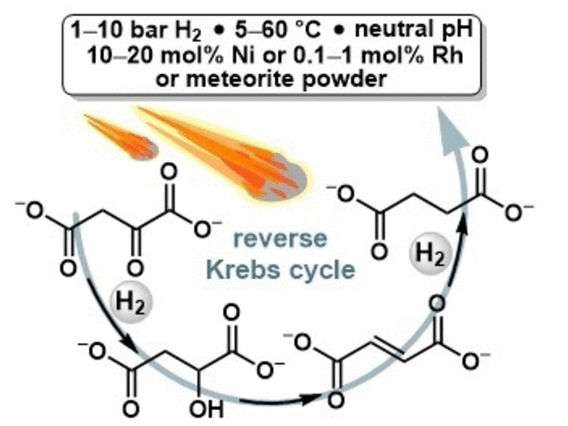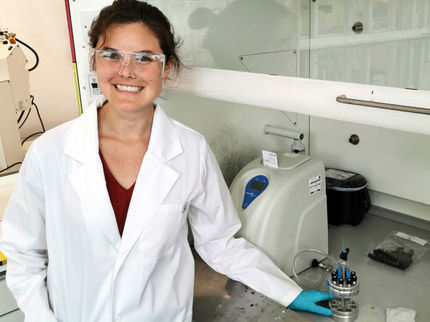Primeval Reaction Pathways
Some reactions in the reverse Krebs cycle can also be run under meteorite catalysis
Naturally occurring chemical reactions may have evolved into the biochemical processes we know today. A team of researchers has now discovered that a reaction sequence from the so-called reverse Krebs cycle—a fundamental biochemical process—can also take place without enzymes. The team writes in the journal Angewandte Chemie that metals and even powdered meteorite material can catalyze the hydrogenation reactions.

© Wiley-VCH
Cells obtain energy and molecular building blocks through metabolic processes. Compounds are synthesized and broken down again in universal biochemical processes with the help of enzymes. However, simple organic molecules such as organic acids, amino acids, and peptides have been found in extraterrestrial objects, suggesting that organic molecules might have existed on early Earth, even before life as we know it developed.
Taking the theory of a self-organizing chemical network, some fundamental biochemical reaction sequences derived from naturally occurring chemical reactions may have evolved into the biochemical processes we know today. Sophia Rauscher and Joseph Moran of the University of Strasbourg, France, have now investigated a sequence of the reverse Krebs cycle, a biochemical process used by some microorganisms for fixing carbon dioxide. In this portion of the process, the small organic molecule oxaloacetate is hydrogenated and dehydrated to give succinate in three chemical steps.
In the cellular reverse Krebs cycle, hydrogenation—the attachment of hydrogen atoms—takes place using enzymes that transfer organically bound hydrogen. In order to simulate hydrogenation as it might have occurred on the primordial earth three to four billion years ago, Rauscher and Moran used elemental hydrogen and metal catalysts. They justified these choices since hydrogen is formed in natural geological processes and can accumulate in reservoirs in the ground or in hydrothermal vents. In addition, meteorites that fell to earth during this period brought metals with them.
In the experiment, malate was initially formed from oxaloacetate in a hydrogenation reaction, even under mild reaction conditions, mimicking the first hydrogenation step in the pathway. Following the dehydration of malate to fumarate, succinate was formed from fumarate in a further hydrogenation step, following the same sequence of molecules and reactions as in the biological reverse Krebs cycle. Metals such as nickel and even pure powdered meteorite sample were able to catalyze the reactions. These findings could prove relevant for our understanding of the origins of some fundamental metabolic pathways, the authors argue.
Original publication
Other news from the department science

Get the life science industry in your inbox
By submitting this form you agree that LUMITOS AG will send you the newsletter(s) selected above by email. Your data will not be passed on to third parties. Your data will be stored and processed in accordance with our data protection regulations. LUMITOS may contact you by email for the purpose of advertising or market and opinion surveys. You can revoke your consent at any time without giving reasons to LUMITOS AG, Ernst-Augustin-Str. 2, 12489 Berlin, Germany or by e-mail at revoke@lumitos.com with effect for the future. In addition, each email contains a link to unsubscribe from the corresponding newsletter.





















































